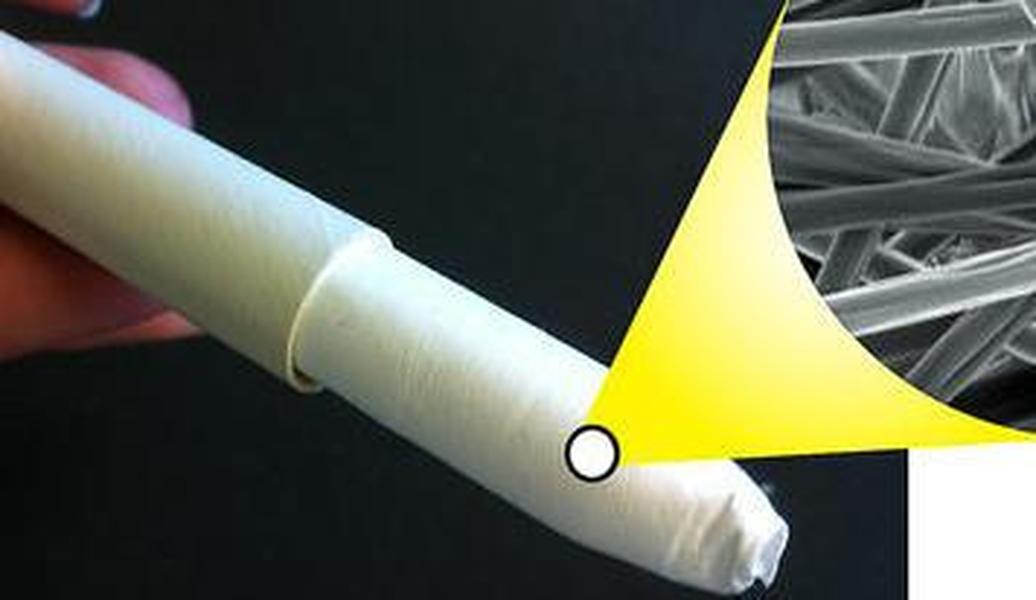A new anti-HIV 'tampon' could save the lives of women


A free daily email with the biggest news stories of the day – and the best features from TheWeek.com
You are now subscribed
Your newsletter sign-up was successful
Bioengineers are working on a new way for women to protect themselves from HIV, using electrically spun fabric and microbicides.
Close to 84 percent of women diagnosed with HIV are infected via heterosexual sex, NPR reports. Right now, the only contraception that works and is controlled by the woman is a female condom, which can be difficult to use and not too easy to find. Knowing this, Cameron Ball and Kim Woodrow of the University of Washington in Seattle decided to try something new.
Researchers have long been trying to perfect creams using microbicides, or anti-HIV drugs. They can be messy and absorb very slowly, meaning they need to be used at least 20 minutes before intercourse. But a new fabric that is electrically spun could deliver high concentrations of microbicides to vaginal tissue faster, in just 6 minutes.
The Week
Escape your echo chamber. Get the facts behind the news, plus analysis from multiple perspectives.

Sign up for The Week's Free Newsletters
From our morning news briefing to a weekly Good News Newsletter, get the best of The Week delivered directly to your inbox.
From our morning news briefing to a weekly Good News Newsletter, get the best of The Week delivered directly to your inbox.
The fabric is made from a polymer using nanotechnology, and has been approved by the FDA. It’s also flexible and could go into a tampon applicator — but the designers want to hear from their customer base on how they would like to use it. "It's a matter of giving women enough choices and options of what products are available and how they are used," Ball tells NPR. "So you meet the needs of as many women as possible."
The fabric will soon be tested using rabbits and monkeys, and then human testing will start. Ball expects to see the product ready for mass use in 10 years.
A free daily email with the biggest news stories of the day – and the best features from TheWeek.com
Catherine Garcia has worked as a senior writer at The Week since 2014. Her writing and reporting have appeared in Entertainment Weekly, The New York Times, Wirecutter, NBC News and "The Book of Jezebel," among others. She's a graduate of the University of Redlands and the Columbia University Graduate School of Journalism.
-
 How to Get to Heaven from Belfast: a ‘highly entertaining ride’
How to Get to Heaven from Belfast: a ‘highly entertaining ride’The Week Recommends Mystery-comedy from the creator of Derry Girls should be ‘your new binge-watch’
-
 The 8 best TV shows of the 1960s
The 8 best TV shows of the 1960sThe standout shows of this decade take viewers from outer space to the Wild West
-
 Microdramas are booming
Microdramas are boomingUnder the radar Scroll to watch a whole movie
-
 Nobody seems surprised Wagner's Prigozhin died under suspicious circumstances
Nobody seems surprised Wagner's Prigozhin died under suspicious circumstancesSpeed Read
-
 Western mountain climbers allegedly left Pakistani porter to die on K2
Western mountain climbers allegedly left Pakistani porter to die on K2Speed Read
-
 'Circular saw blades' divide controversial Rio Grande buoys installed by Texas governor
'Circular saw blades' divide controversial Rio Grande buoys installed by Texas governorSpeed Read
-
 Los Angeles city workers stage 1-day walkout over labor conditions
Los Angeles city workers stage 1-day walkout over labor conditionsSpeed Read
-
 Mega Millions jackpot climbs to an estimated $1.55 billion
Mega Millions jackpot climbs to an estimated $1.55 billionSpeed Read
-
 Bangladesh dealing with worst dengue fever outbreak on record
Bangladesh dealing with worst dengue fever outbreak on recordSpeed Read
-
 Glacial outburst flooding in Juneau destroys homes
Glacial outburst flooding in Juneau destroys homesSpeed Read
-
 Scotland seeking 'monster hunters' to search for fabled Loch Ness creature
Scotland seeking 'monster hunters' to search for fabled Loch Ness creatureSpeed Read
